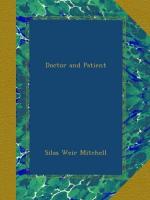More often, in my experience, the opium habit is learned during an illness of limited duration, and for the consequences of which there is always some one to be blamed.
As I remember these patients, and I have seen them by the score, far on in their evil ways, such women are most often those who lack the power, even in health, to endure pain. Some defect of training or of nature has made pain, or even distress or insomnia, ills to be relieved at once regardless of cost. Let them but feel that relief for the time is possible, and self-restraint is over. They will have the thing they crave. You cure them of the vile opium habit at awful cost of suffering, and they relapse on the first new trial of endurance, and men of their type more surely than women.
I see a good many cases of opium, morphia, or chloral habit, and I am sure that these forms of intoxication are becoming more prevalent than they were a generation ago. Is this due to an increase in the disorders which are eased by such drugs? Is it not rather due to the softening influence of luxury, and the fact that we are all being constantly trained to feel that it is both easy and our right to escape pain, however brief?
I am sure, too, that a part of it lies in the readiness with which many physicians give sedatives, and their failure to feel the vast moral responsibilities of their position. But, whatever be the cause or causes, it is well in the hour of ease to learn beforehand the risks which come of too easy and too frequent appeals to agents which benumb the nerves.
When people are first given opium, it is apt to be the friend of the night and the foe of the morrow. Repeated often enough, it loses power to constipate and distress. It still soothes pain. It still gives sleep. At last it seems to be in a measure a tonic for those who take it. But after a while it does some other things less agreeable. The mind and memory suffer, but far more surely the moral nature is altered. The woman becomes indifferent, her affections dull, her sense of duty hopelessly weakened. Watchful, cunning, suspicious, deceitful,—a thief, if need be, to get the valued opiate,—she stops at nothing. It would seem as if it were a drug which directly affected the conscience. At last, before this one craving, all ties in life are slight and bind her not. Insensible to shame and dead to affection, she is happy if the alcohol habit be not added to her disorder, for if she cannot get the one drug she longs for, the other will serve her at need.
There is a popular idea that opium gives pleasant dreams, and that it takes us away into the land of poetry, to which it is supposed to have conducted Coleridge and De Quincey. As a matter of fact, there are but few persons who get more out of opium than relief of pain, sense of comfort, and next day’s remorses. The opium dream is not for all. I have known only four or five cases of habitual and distinct opium dreamers. There was more of Coleridge than of opium in “Kubla Khan,” and more of De Quincey than of the juice of poppies in the “Vision of Sudden Death.” When it came to the telling of these immortal dreams, we may well suspect that the narrative gained in the literary appeal from the poet opium-drunk to the poet sober.




